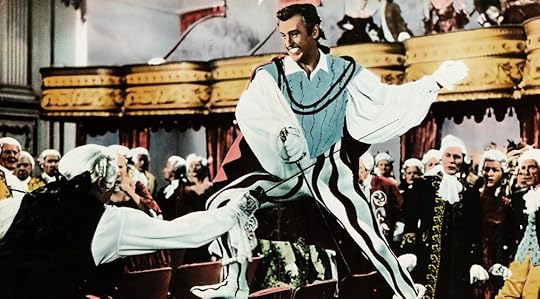Tension in the Workplace
 Get away from me, you psycho bastard.
Get away from me, you psycho bastard.It’s been a long time since I had a co-worker of the opposite sex I just couldn’t stand. As in despised. Reviled. Back when I did, it was a good thing I didn’t have to embrace and kiss that person passionately and profess my love as part of my job. So, imagine you’re an actress on an MGM soundstage working with an actor you loathed, like Eleanor Parker working with Stewart Granger.
The picture they made together, Scaramouche, is a Sabatini novel of revenge set in eighteenth-century France during the Revolution. At the turn of the 1950s, as MGM began turning out Technicolor costume adventures by the bucketful to compete with television, Scaramouche seemed a natural fit, following up on a silent version starring Ramon Novarro released back in 1923.
As usual, I’m not going to review Scaramouche except to say I find it a terrific picture in the classic sense of a vengeance swashbuckler with a couple of neat plot twists at the end. Some of you may know I’m not a fan of Mel Ferrer the movie star or the human being, but I’m the first to say he’s perfect as the antagonist in this picture, the Marquis de Maynes. Everyone’s really good in it, and the plot moves at a breakneck pace.
Headliner Stewart Granger had recently come to the States after a string of successful pictures in the UK, and his first big MGM picture in Hollywood, King Solomon’s Mines, had been a smash. So next he would star in Scaramouche opposite former Warner Bros. leading lady Eleanor Parker, whose contract had not been renewed, resulting in a move to MGM. She played the worldly wise firebrand actress Lenore, who loves and hates Andre Moreau, a self-centered aristocratic reprobate played by Granger. The onscreen relationship between Granger’s Moreau and Parker’s Lenore is tempestuous and disguises a natural animosity that existed between the players.
My pal Dick Dinman interviewed Parker in the 1990s, with Granger as one of the topics of conversation. “I can’t even say his name, I dislike him so much,” Parker began before blurting out, “I hated the man.”
 Young Janet Leigh never looked better.
Young Janet Leigh never looked better.Then she went on to describe a pivotal moment between the actors, a confrontation that took place in a covered wagon: “I had to slap him once in a scene. Slap his face. And he said, ‘If you ever hit me while we’re doing this, if you slap me, I’m going to grab your throat and I’ll kill you.’ He said, ‘I almost killed…’ some British actress and he named her name—I can’t remember who it was now—but he said, ‘I grabbed her by the throat and I almost choked her to death.’ I said, ‘Oh, how nice.’ And he said, ‘If you dare to slap me and hurt me at all, I’m going to do it to you.’ He said, ‘I mean it.’ Oh, he was so mean. My mouth dropped open and I wanted to hit him right then. So the scene came up and we were doing his close-up or whatever and you had to see him get slapped…and I went [she grunts faintly] and my hand went up and back. I just couldn’t hit him; he’s looking at me and I couldn’t hit him. He looked proper because he couldn’t glower at me with his face to the camera. So I didn’t want to hit him.
“The director [George Sidney] said, ‘Cut! Eleanor, what’s the matter with you?’
“I said, ‘I want to talk to you for a minute.’”
 Him: “You fancy me.” Her: “No, I hate you.”
Him: “You fancy me.” Her: “No, I hate you.”They went off by themselves and she told him, “He threatened me. He’s going to grab me by the throat and kill me if I…slap his face, and I don’t know what to do.”
George Sidney said, “He’s a coward. Never mind him. Hit him as hard as you can. Don’t worry. All the crew—everybody, we’re right here to grab that man and kill him if we have to. You just hit him as hard as you can.”
They played the scene and she gave him a stage slap as instructed.
“When they said ‘cut,’ he looked at me, turned around, and he never spoke to me for the rest of the movie. He didn’t do anything, but he never spoke to me. If I walked up and he happened to be in a group, he would turn around and leave or he would stop talking and just stand there until I left. It was most embarrassing. And that’s all I was doing, what the director told me, and I had to do it because it’s written in there [in the script].”
Hearing this story from Parker years ago soured me on Granger, and nothing I’ve heard since really counters the impression she gave of the man. He did indeed have a reputation as a cold narcissist, and what strikes me now watching him is a naked attempt to copy the style and mannerisms of Errol Flynn, which he couldn’t do because he didn’t have Flynn’s charm. Parker had co-starred with Flynn twice and, despite Errol’s bad-boy reputation, said he was a pro on the set and always respectful—never the malevolent presence she described in Stewart Granger. She summed it up saying, “He was so awful, the rudest, nastiest guy; I just hated him. Everybody did.”
To Dick Dinman’s great credit, when he interviewed Stewart Granger, he asked him about the alleged difficulties with Eleanor Parker on the set of Scaramouche. “I don’t know what it was,” said Granger, “but she had great pleasure in smacking me, really belting me as hard as she could. I mean, she didn’t pull her punches. Normally we actors and actresses pull our punches; we slap it away. One scene where I’m sitting on a basket and I’m joking with her and being difficult and she says, ‘Oh, you!’ and she goes and knocked me out. She hit me so hard that for two seconds I can’t think where I am.”
Well, yes, Mr. Granger. You threatened her and the director urged her to let you have it, with 30 or 40 crewmen as backup.
But his next comment revealed the kind of misogynist that ruled in Hollywood at the time: “There were problems with Eleanor Parker. She was a darling, but she was—I guess I was a bit of a naughty fellow, you know. [I] wouldn’t play ball in the way she—I don’t know what it was, but she seemed…you know, a lot of women like to slap men really hard, especially if they fancy you. And I think maybe she fancied me in those tights.”
 Hats off to both Ferrer and Granger for a commitment to excellence making this swordfight sizzle.
Hats off to both Ferrer and Granger for a commitment to excellence making this swordfight sizzle.Um, sure, Stewart. She must have fancied you because you were irresistible in tights. Never mind the threats of murder.
Given that I’m not a fan of Mel Ferrer and I’m not a fan of Stewart Granger, Scaramouche remains for me a hoot. It’s one of those pictures that’s been sort of lost to the ages and definitely one where you need to suspend your disbelief. But, boy, the furious chases on horseback, the lush Technicolor with Janet Leigh in her prime and Parker’s flaming red hair, and the six-and-a-half-minute climactic swordfight in a theater that’s equal parts athletic and deadly, make this for me the best of the 1950s. And knowing of the tension between the leading man and his co-star makes for interesting sport as you watch them work together, especially in that scene in the wagon.
But you know what’s funny? That one female co-worker I just couldn’t stand back in the day is one I now look back on with fondness, understanding in hindsight that I generated a lot of the conflict by being young and full of myself. It doesn’t seem that any such self-reflection ever made it into the mind of the late Stewart Granger.



